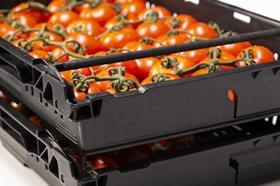
The UK’s leading supplier of British tomatoes has switched to a bespoke packaging in a bid to improve the productivity and efficiency of its supply chain.
APS Group, which is responsible for around 30 per cent of UK tomato production, has worked in partnership with supply chain packaging specialist Polymer Logistics tochange the types of reusable packaging it uses at key stages of its supply journey.
“We needed a comprehensive solution that would enable us to protect the quality of our products while introducing new efficiency into our supply chain,” said APS Group purchasing mabnager Dave Hughes.
“Polymer Logistics has helped us ensure that the products are kept fresher for longer, and the journey from farm to store is quicker, enabling us to cut product waste and unlock new levels of productivity.”
As no existing product was able to address all of the issues faced by the tomato supplier, Polymer Logistics offered to develop a bespoke solution consisting of three different types of products, delivered as a pooling service.
The first step was to replace the crates APS Group used to transport the tomatoes from greenhouses to packhouse. The company had been using deep crates from another manufacturer, but for fear of damaging the products, APS was not able to fill them to the top. Unsurprisingly, this practice was inefficient and costly, as a significant part of each truckload was filled with air.
To reduce the risk of damage to the tomatoes while ensuring that the full capacity of the tray could be utilised, Polymer Logistics replaced the deep crates with its Polynest shallow trays.
The low crates are lightweight, nestable, and stackable, making them well suited for optimising space during storage and transport. The durable design also ensures products are well protected throughout the journey.
“The new crates have had a significant impact on productivity, as APS can now use all available space in each crate, knowing that the products would reach the supermarkets in perfect condition,” said a spokesperson at Polymer Logistics.
Next, Polymer Logistics focused on enhancing hygiene in greenhouse operations, replacing the existing solution with its Cleanpal pallets. They are easy to keep clean and, unlike wood, plastic is non-permeable, reducing the risk of potential pests or disease entering the greenhouse within pallets.
This is vital for protecting the profitability, as contamination can have devastating results. In the case of a tomato brown rugose fruit virus infection, for example, the entire crop will need to be destroyed to control its spread.
“Cleanpal pallets also offer a range of benefits when it comes to storage and worker safety,” Polymer Logistics said. “Weighing just 15 kg, it takes only one person to move them, improving productivity. Furthermore, the nestable design, with a 3:1 nesting ratio, enables significant space savings during storage.”
Finally, to move the tomatoes from storage to store as smoothly as possible, Polymer Logistics provided APS Group with Universal Display Pallets (UDP).
They are easy and secure to stack, saving truck and storage space, and once the products reach the store, the pallet and its contents are instantly ready for display.
“The unique design minimises replenishment costs while maximising in-store availability, and, like most polymer crates, the pallets are hygienic and easy to clean,” Polymer Logistics’ spokesperson said.
The US-based packaging company’s managing director Adrian Dale added: “This was an inspiring project for us. Instead of simply providing one type of product, we had to resolve several challenges at every stage to create a seamless logistics chain.
“It has been great to see how the bespoke solution continues to deliver, giving APS Group the agility they need to adapt to peaks in demand and drive efficiency across all operations.”



